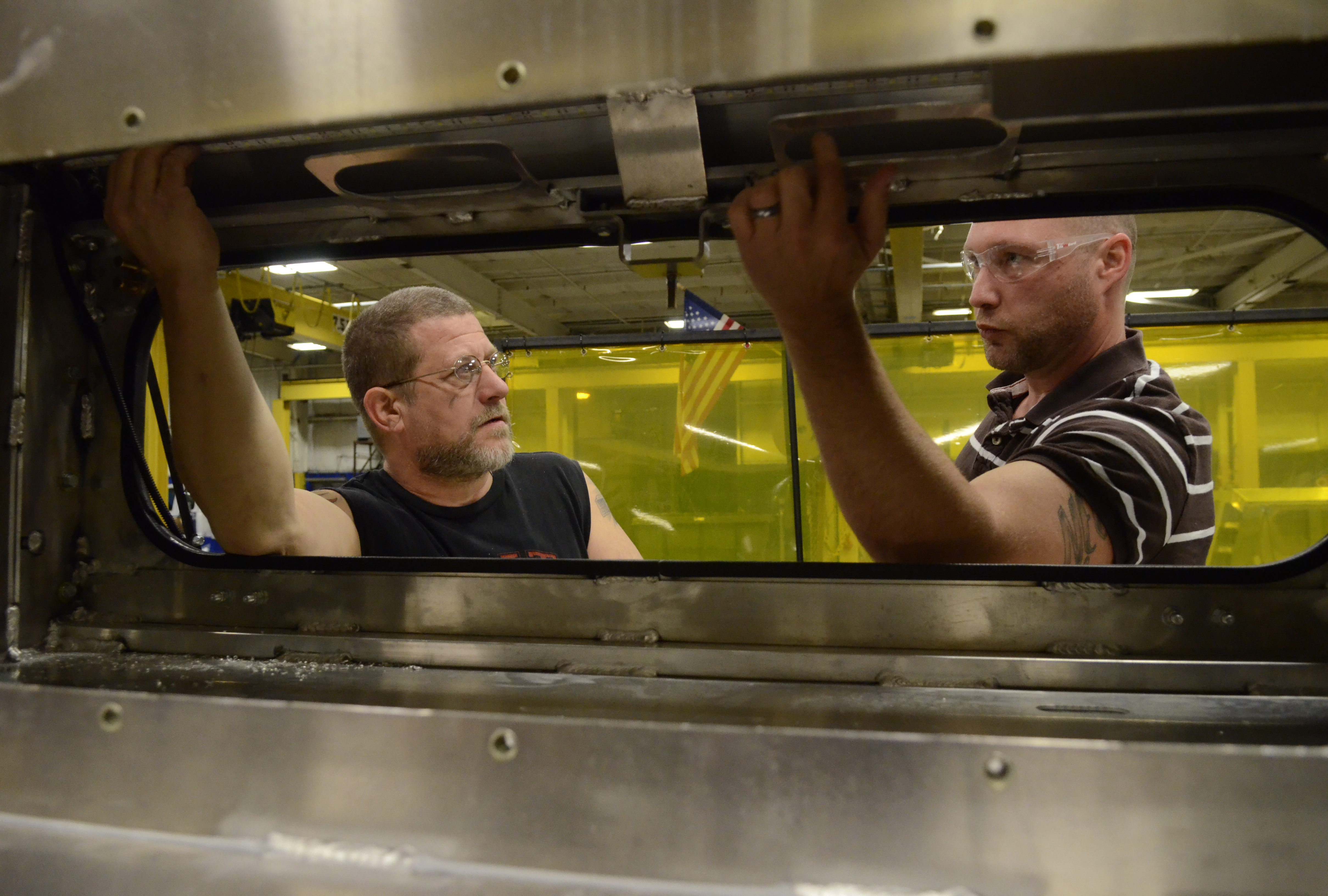 Miller Industries large wrecker supervisor Matt Watson, right, talks with employee Keith True as he prepares to install a wiring harness in a wrecker being built at the Ooltewah manufacturing plant. Watson participated in a leadership training program with an instructor from Chattanooga State Technical Community College.
Miller Industries large wrecker supervisor Matt Watson, right, talks with employee Keith True as he prepares to install a wiring harness in a wrecker being built at the Ooltewah manufacturing plant. Watson participated in a leadership training program with an instructor from Chattanooga State Technical Community College.Chattanooga tow truck maker Miller Industries was taking on a big U.S. government order earlier this year on a tight schedule.
The company needed flexibility in its business and had to reshuffle tasks to pull off the work of supplying 260 armored recovery units for American troops in Afghanistan.
"They performed stellar," said Sias Reyneke, Miller's vice president of operations of the company's 375-person staff.
Reyneke gives credit to leadership skills Miller is developing in its ranks with the help of Chattanooga State Community College.
As the economy comes back after the Great Recession, Chattanooga State is seeing more companies again focus on training, said Ginger Duggan, a business development specialist for the college.
DEMAND RETURNS
"Demand is picking up," Duggan said, noting many companies froze training during the sharp downturn.
For Ooltewah-based Miller, the college developed a 16-week curriculum exploring such skills as planning, decision-making, team building, coaching and delegation.
Dubbed "Miller U.," college instructors came on site to train about a dozen of the company's employees last year and continued with another group in 2011. The company is looking at extending the effort for 2012.
Reyneke said the manufacturer needs to continue to identify and develop managers to face industry challenges.
"We equip them to make decisions," he said.
Hal Priest, human resource director for Chattanooga-based SMP Industries, said that having Chattanooga State training on site made it efficient for its staffers who took similar classwork.
"They don't have to drive off site," he said. "It makes it a lot easier for them. They can return to the job."
FROM WHITE COLLAR TO BLUE
Priest said eight to 10 of the metal fabrication company's employees took part in supervisor training classes. He said the company tested the employees on items it wanted them to learn, and the workers absorbed the skills during the training.
At Citizens State Bank in Jasper, Tenn., eight employees recently were trained in how to handle conflicts and develop personnel at the bank.
"We felt they had inherent ability to lead if they found ways to learn disciplines necessary to make those skills come out," said Barry Allen, executive vice president of banking.
Allen said he has seen examples at the work site of what they learned, especially when it comes to coaching employees and conflict resolution.
He said officials at Citizens are talking with Duggan about next steps they can take in training.
Art Klee, president of Suburban Manufacturing Co. in Dayton, Tenn., said it, too, used Chattanooga State training to help bolster its supervisory team.
"We're trying to build bench strength in our supervisory roles," he said, adding that its workforce is aging. "Being in a rural community, there's not as many opportunities for training."
Yvonne Peppers, Suburban's human resource manager, said the maker of heating and air-conditioning and recreational vehicle products has used Chattanooga State's leadership training since early 2010.
Those employees who have taken part are eager for the next series of classes, she said.
CUSTOMIZED CURRICULA
Duggan said the college's continuing education and corporate training staff customizes curricula to fit companies. About 100 companies have taken part in the past year, she said.
Training programs often depend on factors such as the number of hours a company desires and subject matter, Duggan said.
She said college officials are seeing companies interested in personnel sharpening leadership and technical skills.
"Companies need both," Duggan said.
The Chattanooga State specialist said the college charges for its services, which utilize learning systems from Development Dimensions International. But she wouldn't say how much the training costs individual companies.
"We have to make ourselves self-sustainable," she said.
GIVES TOOLS
Miller employee Jill Seymour, who works in production control for the tow truck maker, said the training enabled her to acquire practical skills for her job.
"It gives me confidence and tools I need to move up," said the seven-year worker.
Matt Watson, who has worked for Miller since 1993 and took part in last year's class offering, said the company deals with a lot of industry change.
"It helps you see the big picture," he said.
Jamison Linden, manufacturing services manager for Miller, said the coursework plants seeds within the employees to get more education on their own.
He said two people who've taken part in Miller U. have gone back to community college.
"It has broadened their horizons," Linden said.
Bill Beckley, Miller's corporate director of human resources, said the money for the two hours of weekly coursework is well spent.
"This is an investment in our people and future," he said. "Our growth plan says we need more people to take on challenges."
According to Development Dimensions International, about 44 percent of organizations have a process of identifying talent within their businesses.
About 37 percent of entities have a process for growing talent in their companies, DDI said.